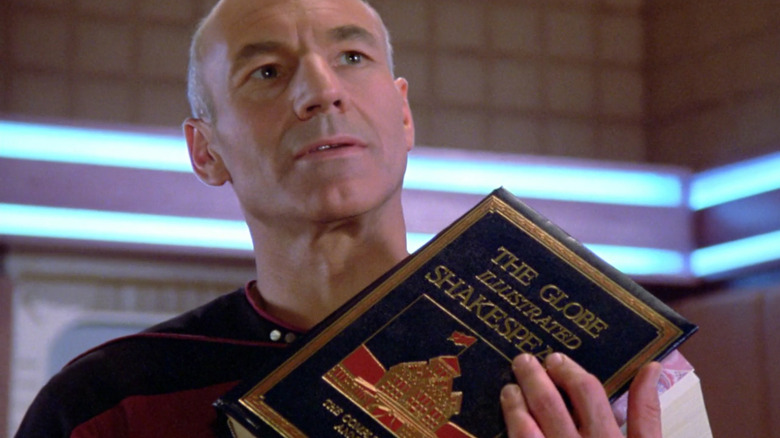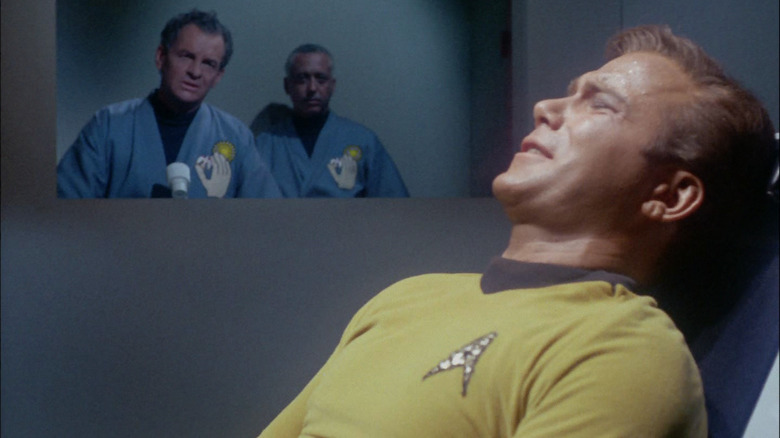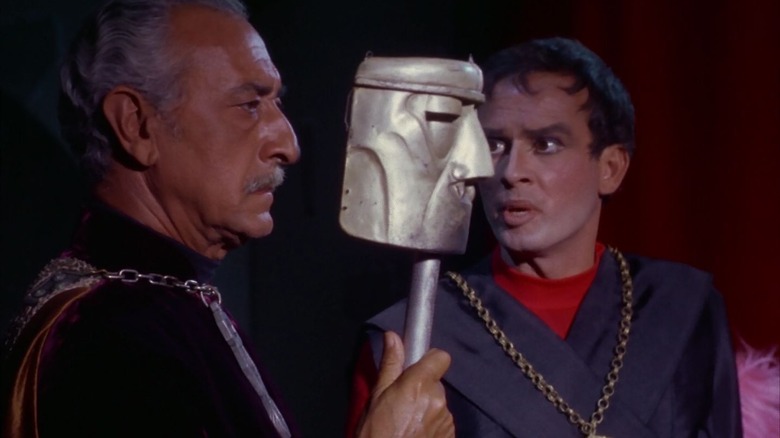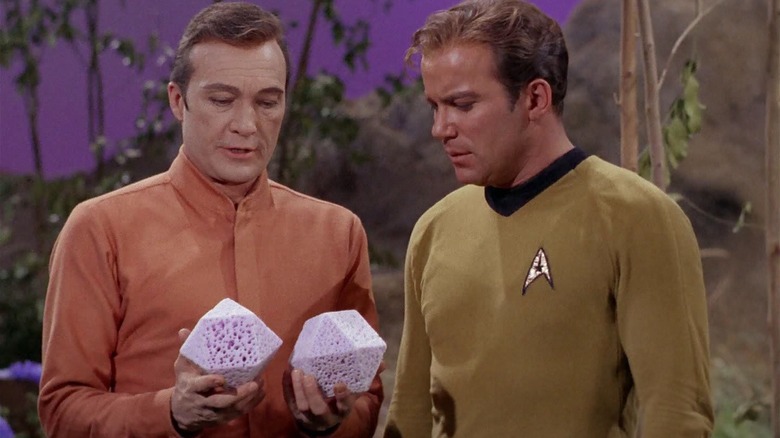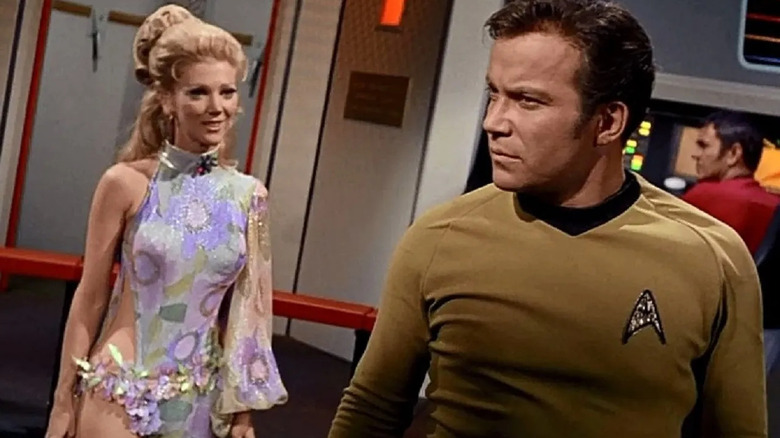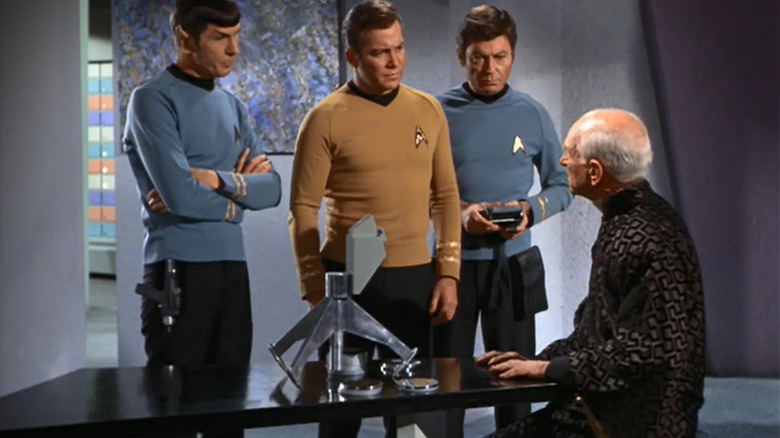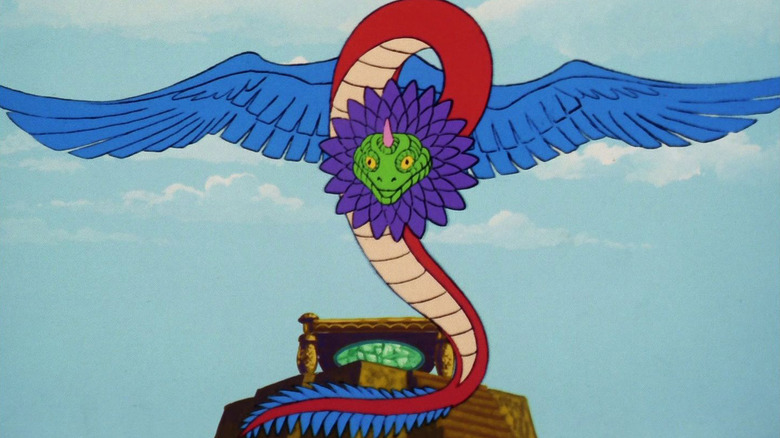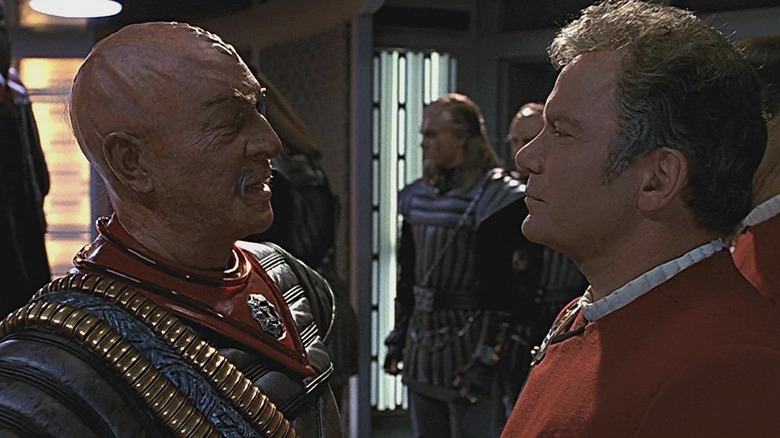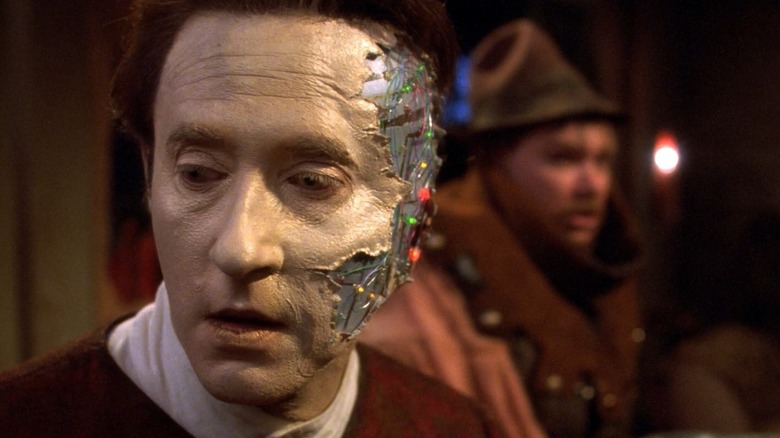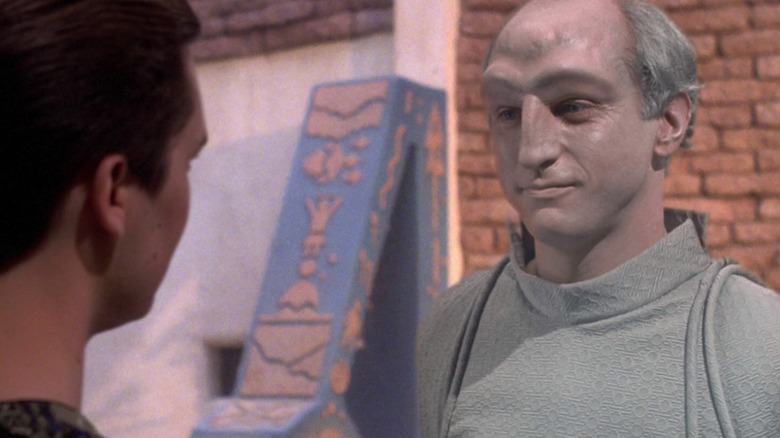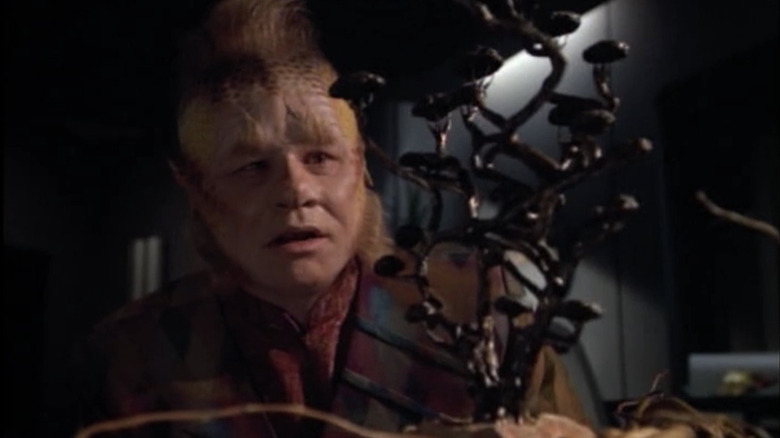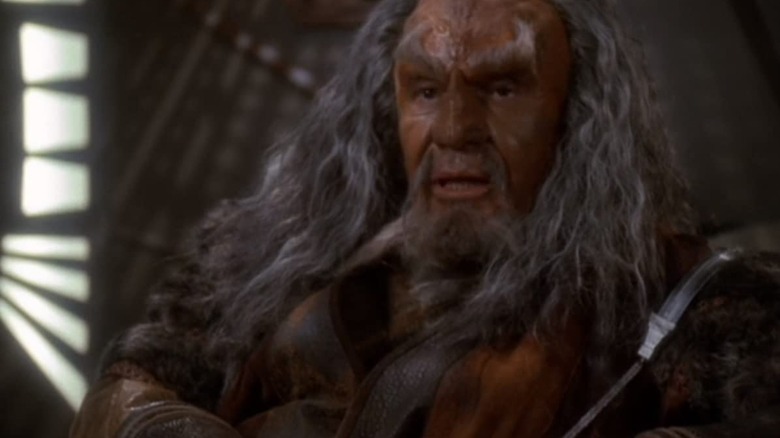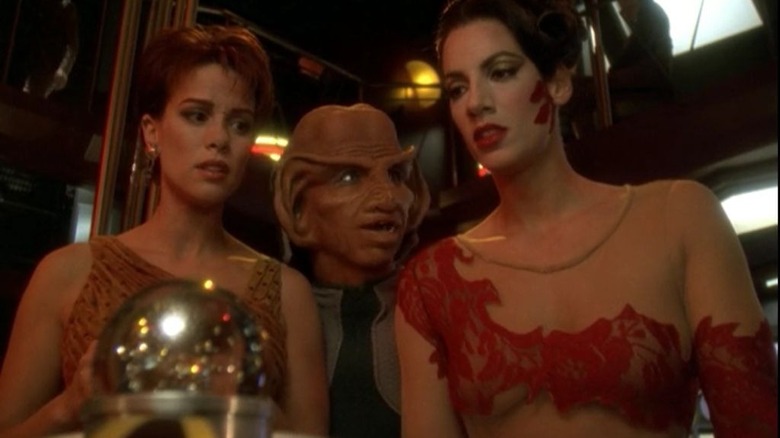Every Star Trek Episode Title That Is Actually A Shakespeare Reference
A recent episode of "Star Trek: Strange New Worlds" — called "The Serene Squall" — opened with a conversation between T'Pring (Gia Sandhu) and Spock (Ethan Peck) on the lack of sexual passion in their long-distance relationship. T'Pring reveals that, since Spock has been living among humans, she has been reading several human authors said to be experts in sexuality. She namedrops Henry Miller's "Tropic of Cancer," Erica Jong's "Fear of Flying," as well as "The Argonauts" by Maggie Nelson, an extended essay on gender, sexuality, and pregnancy that won a National Book Critics Circle Award in 2015. The writers of "The Serene Squall," Beau DeMayo and Sarah Tarkoff, clearly knew enough about the literature of sexuality to include appropriate references in their episode. These casual mentions of real-world books are a bold and old tradition in "Star Trek," and hearing them, however casually, are enough to make every literary nerd in the audience intellectually salivate.
"Star Trek" has always had something of a literary bent, featuring well-read characters (Picard, for instance, is quite familiar with Shakespeare), and often drawing episode titles from canonized classics; An early Trek episode called "Who Mourns for Adonais?" is, for instance, a line from a Percy Shelley poem memorializing John Keats. But it's the Bard of Stratford that appears to be most heavily leaned upon in the "Star Trek" writer's room, and lines of Shakespeare's plays are frequently used as "Star Trek" episode titles.
So many in fact, a list could be filled. Henceforth, let such a list be compiled. With the prologue done, we, your humble patience pray, gently to hear, kindly to judge our play.
Dagger of the Mind
The Title Comes From: "Macbeth"
The Shakespearean Context: When Macbeth, inspired by a witchly prophecy and urged by his ambitious wife, chooses to finally commit an act of regicide that will land him on the throne of Scotland, he finds himself entering a fugue state. On the way to kill the king, he starts to feel an uncontrollable urge, as if the act of murder cannot be prevented. He hallucinates a dagger, pointing his way. Is it real, he wonders, "Or art thou but A dagger of the mind, a false creation Proceeding from the heat-oppressèd brain?"
The Episode: "Dagger of the Mind" (November 3, 1966) sees the Enterprise visiting a state-of-the-art mental facility that boasts an almost-unreal success rate for rehabilitating violent criminals. What Kirk (William Shatner) will eventually discover is that the facility, run by the unscrupulous Dr. Adams (James Gregory), uses a sinister mind-wiping device that can painfully insert impulses into people's brains against their will. The dagger of the mind is a reference to the machine that can stab one in the mind. The ethical question is less to do with regicide and power and inevitability, and more to do with the morals of aggressive psychological treatments.
The Conscience of the King
The Title Comes From: "Hamlet"
The Shakespearean Context: When Hamlet is asked to enact blood revenge by the ghost of his dead father — a common sight in revenge dramas in Shakespeare's time — he balks. Rather than play the role of a revenge hero, Hamlet turns into a meta-commentator, foolishly bringing ethics and self-awareness into a recognizable action plot. Hamlet, in order to prove that his kingly father was killed by his usurping uncle as the ghost claimed, elects to stage the details of the murder as a play, hoping to witness his watching uncle's guilt first hand. "The play's the thing wherein I'll catch the conscience of the king."
The Episode: "The Conscience of the King" (December 8, 1966) is a dark one. Kirk discovers that an aging Shakespearean actor named Anton Karidian (Arnold Moss) was in fact a former mass murderer nicknamed Kodos the Executioner, who once cruelly had 4,000 colonists killed during a food shortage. This was a slaughter that Kirk witnessed as a youth. Kodos might have faked his death and gone into hiding as Karidian, and it will be up to Kirk to investigate and to bring the man to justice. The Shakespearean scenes enacted throughout the episode cement the story parallels, and Karidian's conscience does indeed become a plot point.
By Any Other Name
The Title Comes From: "Romeo and Juliet"
The Shakespearean Context: When two lovelorn teens from opposite warring clans take a shine to one another, they begin to question the foolishness of the rivalry. Romeo Montague, only 16, and Juliet Capulet, only 13, don't know the source of the Montague/Capulet feud, and express frustration why their last names might be the sources of so much angst. Names are meaningless when it comes to character. Juliet asks: "What's in a name? That which we call a rose by any other name would smell as sweet."
The Episode: In "By Any Other Name" (February 23, 1968) the Enterprise encounters a species of ultra-powerful aliens called Kelvans who have taken human form. The Kelvans are able to dehydrate humans into small lightweight sponges, and intend to take over the Enterprise as a tool for dominating new worlds. After most of the crew is dehydrated, it's up to Kirk, Scotty (James Doohan) and a few others to distract the aliens long enough to wrest control back. The "Romeo and Juliet" metaphor is a little thin, as the Kelvans find a new home by the end of the episode, declaring that it, too, can be comfortable. A home by any another name is still a home.
Wink of an Eye
The Title Comes From: "The Winter's Tale"
The Shakespearean Context: "The Winter's Tale" may be one of Shakespeare's weirdest plays. The first part of the play is a grim revenge tragedy about the bitter king Leontes who suspects his wife of infidelity, and who dies. He banishes his daughter Perdita. Fast-forward 16 years, and Leontes rediscovers Perdita living among shepherds in, essentially, a bright, cheerful comedy play. Also the wife has been a statue this whole time? The quote comes from a character named merely "First Gentleman," and reads "Who would be thence that has the benefit of access? Every wink of an eye some new grace will be born: our absence makes us unthrifty to our knowledge."
The Episode: Nothing to do with "The Winter's Tale," "Wink of an Eye" (November 29, 1968) is about Kirk encountering a species who lives at a hyperaccelerated time rate compared to humans, making them imperceptible. One of them (Kathie Browne) is able to change Kirk's time rate so they can communicate, and she explains that her species needs Earth men to procreate. Yes, it's a pretty blunt sex fantasy, a common Trek notion in the early Gene Roddenberry days. Perhaps Shakespeare, when at his bawdiest, would appreciate that.
All Our Yesterdays
The Title Comes From: "Macbeth"
The Shakespearean Context: In the most famous speech from the Scottish play, the title character has convinced himself to commit an increasing number of violent atrocities in a quest to stay on the throne he stole from the murdered Duncan. After so much violence, Macbeth looks over the horizon and gives a chilling speech about how life is bleak and utterly meaningless. "Tomorrow, and tomorrow, and tomorrow, Creeps in this petty pace from day to day, To the last syllable of recorded time; And all our yesterdays have lighted fools The way to dusty death."
The Episode: "All Our Yesterdays" (March 14, 1969) is a bit of an odd duck. Kirk, Spock (Leonard Nimoy), and McCoy (DeForest Kelley) find an advanced planet located right next to a star set to go supernova in a few hours time. The planet contains not only a library, but a magical time travel door that allows people to physically travel great distances and throughout history in an instant. In alternately going though said door, Kirk finds himself in a world akin to 17th century England, while Spock and McCoy find themselves trapped in the Ice Age. Spock will end up reverting evolutionarily, feeling emotions, and falling in love with a cavewoman. The nihilism of Macbeth is not mentioned.
How Sharper Than a Serpent's Tooth
The Title Comes From: "King Lear"
The Shakespearean Context: The elderly King Lear has, rather than name an heir to take his throne after death, attempted to remain diplomatic and divide his kingdom into three parts to be shared among his three daughters Goneril, Regan, and Cordelia. The latter of the three understands this is a horrible idea as the former two have been raised to be conniving and ambitious and will most assuredly use their land shares to muscle the other out of theirs. When Lear learns of a long string of deceptions, he laments his fate. "How sharper than a serpent's tooth it is to have a thankless child!"
The Episode: "How Sharper Than a Serpent's Tooth" (Ocotber 6, 1974) is an episode of the "Star Trek" animated series that finds Kirk and co. on the home planet of a powerful, intelligent serpent monster claiming to be Kukulkan, a god worshiped by the Aztec and Mayan people on Earth. Kukulkan awakens and demands to be worshiped, just like in the good old days. In a move daring for an animated program from the 1970s, Kirk explains, essentially, that humans are pretty much all atheists now, and have outgrown the need for "parenting" once provided by gods. Kirk turns to God and says "you're no longer needed." Kukulkan, sad but understanding, departs. It is the god who shares Lear's sentiment.
Star Trek VI: The Undiscovered Country
The Title Comes From: "Hamlet"
The Shakespearean Context: In the famed "To be or not to be speech," Hamlet, knowing he is being observed, makes a poetic soliloquy about the purpose of life and may be contemplating whether or not to take his own life. The speech also serves as a meta-narrative device wherein Hamlet is questioning his place in a story about a revenge hero, wondering if he needs to fulfil his destiny as a fictional construct, or bring real-world morals into the equation. The undiscovered country is death or oblivion. "Who would these fardels bear, To grunt and sweat under a weary life, But that the dread of something after death, the undiscover'd country, from whose bourn No traveler returns ... ?"
The Movie: In Nicholas Meyer's film "Star Trek VI: The Undiscovered Country" (December 6, 1991) the Klingon Empire has been hobbled by a massive industrial accident (a metaphor for Chernobyl and the Soviet Union) and the Cold War must come to an end. The smooth-talking General Chang (Christopher Plummer) is, it turns out, a Shakespeare fan, and when he visits the Enterprise for a diplomatic dinner, he quotes a lot. At that dinner, Chang recontextualized "the undiscovered country" as the future. It's a tactful redefinition, and one that's addressed in dialogue.
Thine Own Self
The Title Comes From: "Hamlet"
The Shakespearean Context: The character of Polonius, father of Laertes and Ophelia, has agreed to let his rascally son return to France to continue his studies abroad. Before he lets Laertes go, though, Polonius lays down a long litany of axioms and advice — "Neither a borrower nor a lender be," etc. — for his son to follow closely. He ends it with "This above all: to thine own self be true, And is must follow as the night the day, thou canst not then be false to any man." The advice is sage, but ironic. Listen to everything I say, but to thine own self be true.
The Episode: "Thine Own Self" (February 14, 1994) sees the android Data (Brent Spiner) severely damaged while he is cleaning up nuclear materials on a distant planet alone. The damage erases his memory and sees him wandering over to the planet's locals, currently living through their equivalent of Earth's 16th century. Data is suspected to be an Ice Man (hence his pale skin and golden eyes). The radioactive materials he was cleaning up become used in local jewelry, however, and the whole village becomes poisoned. Data, being scientifically minded despite the memory loss, must find a way to cure the radiation poisoning. He is true to himself. Fitting title.
Journey's End
The Title Comes From: "Twelfth Night, or What You Will"
The Shakespearean Context: The phrase "journey's end" may seem simple, but it comes from a song sung by the Clown in the comedy "Twelfth Night," a deliciously queer play about a woman who goes undercover as her presumed dead twin brother, ends up accidentally seducing a local noblewoman while, in turn, falling in love with the local duke (who is also in love with said noblewoman). The itinerant clowns of the play are fun-loving drunks who exist to annoy the boring old Malvolio and sing songs. "Trip no further, pretty sweeting, journey's end in lovers' meeting." The spirit of comedy.
The Episode: "Journey's End" (March 28, 1994) aired during "Next Generation's" final season, meaning a lot of plots had to be wrapped up in time for the series finale. Wesley Crusher (Wil Wheaton) had always endeavored to graduate Starfleet Academy, but became disillusioned when an old treaty forces Starfleet to remove a colony of indigenous people from their home planet in favor of the conquering Cardassians. Wes ends up leaving all of humanity behind by following the cosmic entity called The Traveler (Eric Menyuk). The "Twelfth Night" reference has no bearing.
Mortal Coil
The Title Comes From: "Hamlet"
The Shakespearean Context: Another quote from the famous "To be or not to be speech," wherein Hamlet talks about shedding his mortal body, finally sleeping. But then — the rub — you might dream in death. "For in that sleep of death what dreams may come, when we have shuffled off this mortal coil, must give us pause: there's the respect that makes calamity of so long life."
The Episode: "Star Trek," as seen above, is a pretty explicitly atheist show wherein godlike beings appear only to be defied, rejected, slapped across the face, told to go away, or blasted away by Spock. What is rarely dramatized, then, is a struggle with losing faith in God. That story is told in the "Voyager" episode "Mortal Coil" (December 17, 1997) wherein Neelix (Ethan Phillips) is killed on an away mission. After many minutes, he is brought back to life by Borg technology, upset that he did not face the afterlife. He saw nothing at all. The episode is about Neelix finding meaning after losing faith. Pretty hard-hitting stuff. And in keeping, at least partly, with Hamlet's speech.
Once More Unto the Breach
The Title Comes From: "Henry V"
The Shakespearean Context: A bold, rousing line from a bold, rousing speech. In "Henry V," the titular king is leading an army of brave English solider during the Siege of Harlfeur, comparing them to animals — tigers! — insisting that they tap into the more violent, savage aspects of their own nature. The tone of "Henry V" is largely heroic in these scenes, and the lines read pretty straightforward: "Once more unto the breach, dear friends, once more, or close the wall up with our English dead!"
The Episode: In "Once More Unto the Breach" (November 9, 1998), an aging Klingon named Kor (John Colicos) comes to Deep Space Nine to ask Worf (Michael Dorn) for a ship so that he may fly off and seek an honorable death in battle (an important event for Klingons). Kor is repeatedly stymied in his requests, and may have to face the fact that he may die dishonorably of old age. No "Henry V" moments for him. He cannot stuff up a breach in a wall with his body in order to aid his king and country. By the episode's conclusion, however, circumstances will provide him with the noble death he wants.
The Dogs of War
The Title Comes From: "Julius Casear"
The Shakespearean Context: After Caesar is assassinated (spoilers!), Marc Antony is briefly left alone with his body. He gets his dander up by swearing revenge against the assassins, making a war-tinged speech about his next move. "And Caesar's spirit, ranging for revenge, with Ate by his side come hot from hell, shall in these confines with a monarch's voice Cry "Havoc!" and let slip the dogs of war, that this foul deed shall smell above the earth with carrion men, groaning for burial."
The Episode: "The Dogs of War" (May 24, 1999) was the penultimate episode of "Deep Space Nine," and a time when a dozen plot threads and 30 characters were all gathering to determine the fate of a years-long, multi-pronged war. A two-hour finale is coming, so much of "The Dogs of War" was mere stage-setting, pointing out that a lot may soon be lost. The dogs or war, soldiers, are to be slipped, and many may die. Oh yes, and Rom (Max Grodénchik) may become Grand Nagus. It's all so busy! The Shakespearean phrase only denotes the fierceness of ongoing conflict.
